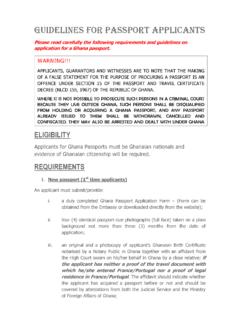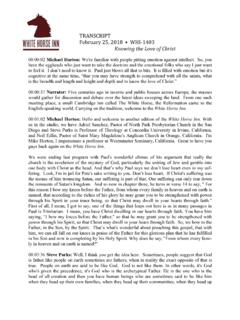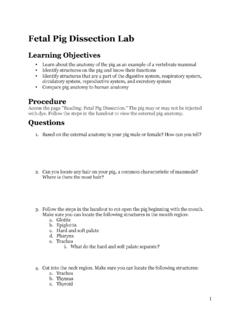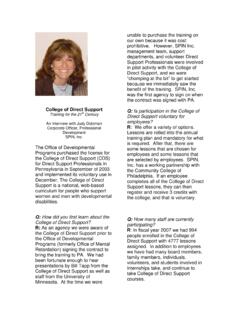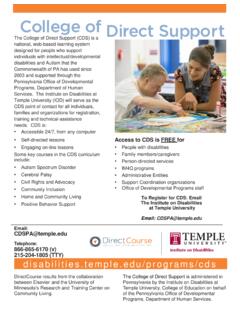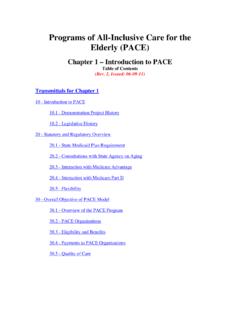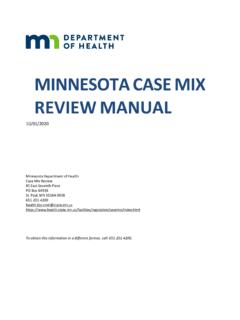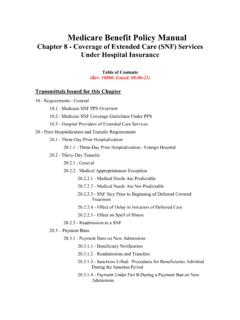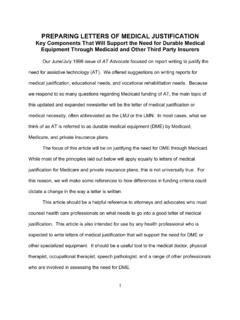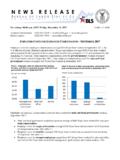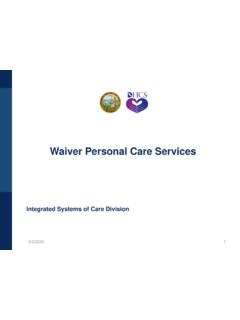Transcription of VALUES IN ACTION - Amazon S3
1 VALUES IN ACTIONE veryday Lives: VALUES in ACTION , 2016. Pennsylvania Department of Human Services, Office of Developmental Programs NANCY THALER, Deputy Secretary, Office of Developmental ProgramsDEPUTY SECRETARY S MESSAGEJohn McKnight, an emeritus professor of education and social policy at Northwestern University, had a message in the first Everyday Lives publication in 1991 that is even more relevant today: Our goal should be clear. We are seeking nothing less than a life surrounded by the richness and diversity of community. A collective life. A common life. An everyday life. A powerful life that gains its joy from the creativity and connectedness that comes when we join in association as citizens to create an inclusive world. Everyday Lives affirms our dedication to making it possible for everyone to live a life of meaning and LIVES, 1991 BY THE NUMBERSVALUES IN ACTIONRECOMMENDATIONSHISTORYSTORIESVALUE S STATEMENTSRECOGNITIONSee how Everyday Lives looked in the beginning Data sets show the importance of work, relationships, and moreLearn about the VALUES behind Everyday LivesGuidance for developing meaningful policy and programs Accomplishments of the past raise expectations for the futureTake a peek into the everyday lives of eight PennsylvaniansPeople with disabilities and their families say what is important to themGroup of committee members who made this publication possible41416202567104 PENNSYLVANIA DEPARTMENT OF HUMAN SERVICESIn 1989, the Pennsylvania Office of Developmental Programs (ODP) invited people with disabilities, families, advocates, governmental officials, and service providers to think about what the future should look like for all people with disabilities.
2 Pennsylvania had been a national leader in creating community services as an alternative to institutional services, but it was time to think more deeply about what the purpose of community services should be what kinds of experiences and opportunities people should have and what the overall outcome should months, participants conducted research about best practices and discussed their findings. Most importantly, the planning group asked people with intellectual disabilities what was important to them. The result was a list of Everyday Lives principles that has guided ODP and the service system since Everyday Lives was published in 1991. Deeply rooted in the concept of self-determination, Everyday Lives promotes the belief that, with the support of family and friends, people with disabilities can and should decide how to live their lives. The original Everyday Lives told us what was important to people with disabilities and made recommendations about how the service system should increase opportunities for full community participation, provide individuals with more control over services, and improve the system s accountability for assuring health, safety, and positive outcomes.
3 EVERYDAY LIVES, 1991An illustration from the 1991 Everyday Lives publication shows what people with disabilities value in their lives. 5 july 2016In November 2014, ODP formed the Information Sharing and Advisory Committee (ISAC), an ongoing committee to discuss policies and practices and make recommendations to ODP. More than 265 stakeholders conducted research and evaluated best practices to determine the most important steps for ODP to take to improve system delivery. Recommendations were submitted by the Futures Planning Work Group and were further developed and explored by ISAC members, resulting in this edition of Everyday Lives. CREATING EVERYDAY LIVES, 2016 6 PENNSYLVANIA DEPARTMENT OF HUMAN SERVICESEVERYDAY LIVES: VALUES IN ACTION The foundation of Everyday Lives: VALUES in ACTION is two statements: 1. We value what is important to people with disabilities and their families, who are striving for an everyday life. An everyday life is about opportunities, relationships, rights, and responsibilities.
4 It is about being a member of the community, having a valued role, making a contribution to society, and having one s rights as a citizen fully respected. It is a vision that we should all be working toward People with disabilities have a right to an everyday life; a life that is no different than that of all other citizens. This continues to be the truest statement on which we can build our work. Everyday Lives will be a guide to ODP as it develops policy and designs programs. Providers of services will use the recommendations of Everyday Lives to support individuals and their families to achieve an everyday life. Everyday Lives will guide everyone toward the possibility of an everyday life. 7 july 20161940s Families across the commonwealth formalized their support and advocacy network with incorporation of the Pennsylvania Association for Retarded and Handicapped Children, 19491960s The Mental Retardation Facilities and Community Mental Health Centers Construction Act ( ) provided money to build community facilities, 1963 Social Security Act Amendments ( 88-97) established medicare and Medicaid, 1965 The Pennsylvania MH/MR Act established a system of community services, 19661970s PARC vs.
5 Commonwealth established the right to education with due process in Pennsylvania, 1971 Pennsylvania funded Family Support Services for the first time, 1971 Pennsylvania began funding Community Living Arrangements for the first time, 1971 The Federal Education for All Handicapped Children Act (94-142) mandated free, appropriate, and individualized education for all children in the least restrictive environment, 1975 Protection and Advocacy system was mandated ( 94-103), 1975 Federal court rules that institutionalization is a violation of constitutional rights to equal protection in the case of PARC vs. The Pennhurst State School and Hospital, 1977 HISTORY Accomplishments of the past raise expectations for the future8 PENNSYLVANIA DEPARTMENT OF HUMAN SERVICES1980s Lifesharing program began, 1982 Self advocates in Pennsylvania formalized their peer support group and incorporate as Speaking for Ourselves, 1982 Federal Fair Housing Act added disability as a protected class, 19881990s Americans with Disabilities Act (ADA) was passed, 1990 Early Intervention Services System Act was signed by Gov.
6 Robert P. Casey, 1990 Everyday Lives was published by Gov. Casey, 1991 Waiting list campaign: Individuals and families advocated for services for people and families who have been waiting for a long time, 1998 Multi-Year Plan for Pennsylvania s system of services for people with disabilities and their families was published by Gov. Tom Ridge, 1997 Pennsylvania included post-secondary education options in waiver services, 1997 Five Year Plan to Address the Waiting List was adopted, Gov. Ridge, 1998 Self Determination grant was awarded by the Robert Wood Johnson Foundation, 1999 Cover of the 2001 publication, Everyday Lives: Making It 2016 The Person/Family Directed Support Waiver was implemented, 1999 Supreme Court ruled in Olmstead vs. that integration is for everyone, 19992000s Independent Monitoring for Quality (IM4Q) was established, 2000 Everyday Lives: Making It Happen, was published by Gov. Mark Schweiker, 2001 Autism Task Force produced a report, 2004 PA Act 62, Autism Insurance Act was established, 2008 ODP initiated services to adults with autism, 2008 2010s Pennsylvania State Senate Bill No.
7 458 was passed amending the Mental Health and Mental Retardation Act of 1966 by renaming it the Mental Health and Intellectual Disability Act, 2011 Futures Planning Work Group met, 2013-15 Home and Community-Based Services (HCBS) Final Rule mandated inclusive settings and person-centered practices, 2015 PA was accepted into the National Community of Practice: Supporting Families throughout the Lifespan, 2016 Gov. Tom Wolf signed the Employment First Executive Order to increase competitive, integrated employment among people with disabilities, 2016 Pennsylvania Department of Human Services officially updated language to remove outdated or offensive terms in 24 chapters of regulations, 2016 Gov. Wolf signed into law the Pennsylvania Achieving a Better Life Experience (ABLE) Act so people with qualified disabilities and their families can open tax-exempt savings accounts to be used for disability-related expenses, 201610 PENNSYLVANIA DEPARTMENT OF HUMAN SERVICESE veryday Lives in ACTION ; Value Statements is presented in two parts.
8 The VALUES statements on pages 10 and 11 are provided to help other people understand what is important to people with disabilities. Part two on pages 12 and 13 tells us what families value and what they need from supporters and the community to achieve the hopes and dreams of their family with disabilities may refer to themselves in different ways. Self advocate is the preference for some people. Others prefer people with disabilities, and others prefer not to be identified by their disability at all. Family means both those related by birth and those chosen as family; supporters mean those who provide services and supports, including natural, public, and private resources; community means people interacting with whom they live, work, play, and worship. These VALUES should guide every decision made by, for, and about people with an intellectual disability or IS IMPORTANT TO PEOPLE WITH DISABILITIESVALUES STATEMENTSEVERYDAY LIVES IN ACTION : MY LIFE, MY WAYCONTROL: I have control over all areas of my life.
9 My family, supporters, and community know these are my decisions and work with me to achieve greater : I decide everything about my life. My family, supporters, and community help me learn about opportunities and together we make them : I have the same rights as all other members of the community and I can fully use them. My family, supporters, and community respect my : Changes to my life are made only with my permission and input. My family, supporters, and community do nothing about me without me. They plan with me to meet my needs, now and for the CONTRIBUTION: I want to work and/or have other ways to contribute to my community. My family, supporters, and community support me to find and keep a real job that I like with good wages and benefits or start and run my own business, and/or volunteer the way I want in my AND SAFETY: I am healthy and safe in all areas of my life. I, my family, supporters, and community balance health, safety, and risk according to my wants and : I am respected and valued for who I am and want to be.
10 My family, supporters, and community treat me with dignity and support me in a person-centered : I am a full member of my community with respect, dignity, and status. My family, supporters, and community know me as a person, welcome and accept : I decide who is in my life: friends, family, partners, neighbors, pets, and others in the community. My family, supporters, and community respect the relationships I choose and support me to form new : I am dependable and honor my commitments. I keep my word. My family, supporters, and community are honest and fair, do what they re supposed to do, and keep their : I need people in my life who will honor my life s journey. My family, supporters, and community work together with me to build : I am listened to and understood; my input is valued. My family, supporters, and community listen to me and communicate in ways that work for : I want my life my way. I, my family, supporters, and the community make sure the services I choose are proved to be of high : I am the best I can be in the goals that I decide.

